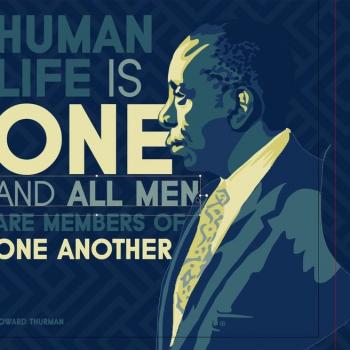Editor's Note: From time to time, we hear from organizations or individuals who object to the way in which they were characterized by one of our writers. We encourage them to join the conversation and share their own thoughts on the Patheos platform, and in this case the Liberty Institute was gracious enough to share a response to a post from Hemant Mehta, The Friendly Atheist, for us to publish.
Although Hemant Mehta (the "Friendly Atheist") may disagree with a Texas judge's decision to grant an injunction allowing religious messages at football games, he cannot truthfully deny that it is a victory for the Kountze cheerleaders.
By way of background, this year, the cheerleaders at Kountze ISD decided to use positive, religious messages instead of negative, often violent messages (think "Scalp the Indians"), on their cheerleading banners. After a Wisconsin-based anti-religion group complained, the superintendent banned the religious speech.
In response, the cheerleaders brought a lawsuit. They argued that the school's order prohibiting religious speech violated their rights. The court agreed, and issued a temporary injunction, preventing the school from censoring the cheerleaders' religious messages.
In his initial posting on October 30, 2012, Mr. Mehta accused Liberty Institute of "lying" when calling the temporary injunction a victory. His blog was titled: "Liberty Institute Lies about Winning Court Case Regarding Kountze Cheerleaders."
That wasn't very "friendly," if you ask us.
After Liberty Institute wrote Mr. Mehta a letter explaining the significance of a temporary injunction and provided him a copy of the order, he toned down his rhetoric. He now accuses Liberty Institute of "exaggerating" the claim of victory. The posting now reads: "Liberty Institute Exaggerates Their Win in a Court Case Regarding Kountze Cheerleaders."
Although we appreciate that Mr. Mehta no longer accuses us of blatant dishonesty, his claim that we are "exaggerating" remains incorrect.
By all accounts, Mr. Mehta is not a lawyer and did not attend law school (indeed, Mr. Mehta's biography states that he is a high school math teacher). It strikes us as strange that one who has no legal training would opine about the merits of a temporary injunction.
A temporary injunction is an "extraordinary remedy" (Walling v. Metcalfe, 863 S.W.2d 56, 57 (Tex. 1993)) that courts do not grant lightly. Before issuing such an order, the court must determine that plaintiffs have a probable right to the relief sought. In doing so, the court must assess the merits of the case.
In the Kountze case, the court heard live testimony from four witnesses and received extensive briefing from the cheerleaders, the school district, and the Texas Attorney General's Office. After considering all the evidence and legal authorities, the judge ordered the Kountze Independent School District and its superintendent, Kevin Weldon, to "cease and desist from preventing the cheerleaders of Kountze Independent School District from displaying banners on run throughs at sporting events and/or censoring the sentiments expressed thereon."
There is no question that this was a victory for our clients, the Kountze Cheerleaders.
First, the Order prevents the school district from censoring the speech contained on their religious banners for the rest of the season, until the trial scheduled for June of next year.
Second, the court determined that allowing the school to censor the banners would cause the Cheerleaders "probable, imminent, and irreparable injury" because the school's "unlawful policy prohibiting religious expression" will "prohibit [the Cheerleaders] from exercising their constitutional and statutory rights at all football games and other sporting events." Importantly, the judge recognized that the school's conduct was unlawful and violated the cheerleaders' rights.
To accuse Liberty Institute of making false statements and/or exaggerating regarding the current status of this case is to ignore the effect of the injunction and the plain wording of the court's order.
Unfortunately, Mr. Mehta's misguided statements do not end there.
He implies that students who wear school uniforms no longer have free speech rights. It is axiomatic that students do not "shed their constitutional rights to freedom of speech or expression at the schoolhouse gate." Tinker v. Des Moines Indep. Community Sch. Dist., 393 U.S. 503, 506 (1969). Students have constitutional rights, even while wearing school uniforms and standing on a football field. If a football player prayed with his teammates before an important play, or "Tebowed" on the field, no one would argue that this is impermissible. In the same manner, the cheerleaders' speech is protected, even though it occurs while on the football field and while the cheerleaders are wearing uniforms. (Although in this case, the cheerleaders' uniforms are paid for with private funds and do not belong to the school.)




